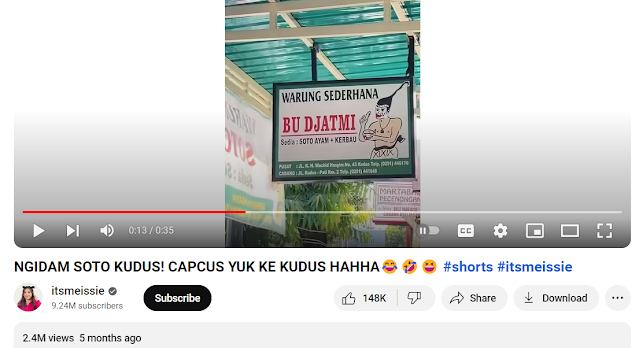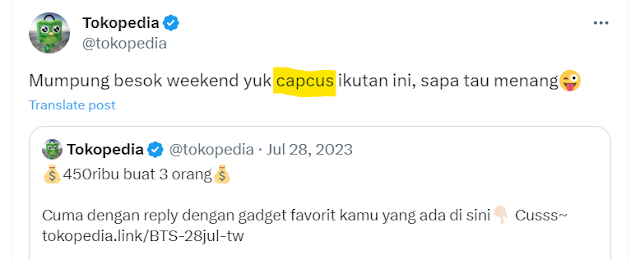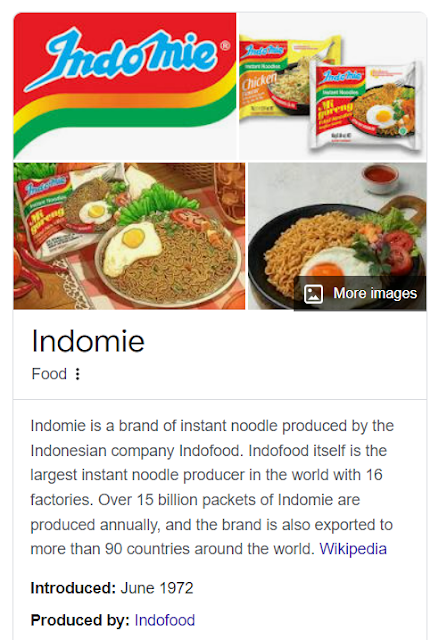- Get link
- X
- Other Apps
Posted by
Iman Prabawa
on
- Get link
- X
- Other Apps
Halo semuanya, ketemu lagi sama saya, Iman Prabawa. Today, I want to talk to you about the meaning of the word [capcus] in Indonesians. We are also going to be watching examples from movies, YouTube videos, and others where Indonesians use the word.
If you have any questions regarding the Indonesian language, you can ask me directly. You can see how to do that on my About Me page.
If you are a beginner in the Indonesian language, you can learn step by step with My Lesson Here.
So, without further ado, let's dive in!
Capcus In Indonesian
[Capcus] is a word that you use when you want to urge or encourage someone to join you in leaving a place or starting an activity. It's like [let's go!] in English.
Example sentence:
1. Ngidam Soto Kudus! Capcus yuk ke Kudus! Haha.. (I'm craving for Soto Kudus. Let's go to Kudus! Haha..)
2. Mumpung besok weekend, yuk capcus ikutan ini! Sapa tau menang. (Since tomorrow is the weekend, let's participate in this! Maybe you can win.)
[Sapa] is the colloquial way of saying [siapa] = who. [Sapa tau menang] = [siapa tahu menang] can also be translated as [who knows, you can win].
3. Capcus ke Bogor yuk! (Let's go to Bogor!)
How to Pronounce Capcus
Here is how you pronounce [capcus] in bahasa Indonesia.
Moving on, let's watch video examples where Indonesians use the word [capcus].
Example of Capcus In Use
The first example we are about to watch is from Anak Kuliner's YouTube channel. Let's watch the clip below.
Below is what he says in the clip above with English translations.
Anak Kuliner: Oke, ngga usah lama-lama. Ee.. Ini kita langsung aja ke belakang. Terlihat cukup ramai. Mudah-mudahan ngga ngantri panjang ya. Udah laper, cuy! Yuk, langsung capcus. Warmindo Mustari. (Let's not wait any longer. Let's go straight to the back. This place looks packed. I hope that I don't have to queue for so long. I'm really hungry right now! Come on. Let's go to Warmindo Mustari.)
In this clip, he says, "Yuk, langsung capcus" when he is about to go to the place to eat. So, [capcus] here is used to encourage to go to a place. [Capcus] in this context can be replaced with [cabut], [pergi] or [jalan]. [Yuk, langsung capcus] = [yuk langsung cabut] = [yuk langsung pergi] = [yuk langsung jalan] = without further ado, let's go!
Vocabulary From the Clip
[Ngga usah lama-lama] = [tidak perlu berlama-lama lagi] = we don't need to wait any longer.
[Ee] is a filler word. It doesn't have any meaning.
[Ini] = this.
[Aja] is a common reduction for [saja] = just.
[Ramai] = packed, busy.
[Ngantri] is a common reduction for [mengantri] = to queue.
[Panjang] = long.
[Udah] is a common reduction for [sudah] = already.
[Laper] is informal for [lapar] = hungry.
[Cuy] = bro. For more about this, you can read my article here: Cuy In Indonesian.
[Warmindo] is short for WARung Makan INDOmie. [Warung makan] means a place to eat, like a restaurant, but [warung makan] is not as big as restaurants. [Indomie] is a brand of noodles in Indonesia. It is so famous in Indonesia.
This wraps up today's article. If I find another example, Insha Allah, I will update this article again. Thank you very much, and I'll see you soon. Bye now.
- Get link
- X
- Other Apps
Hello, I'm Iman Prabawa a.k.a Pak Guru Iman. I love to share about languages. My Instagram, @pakguruiman





Comments
Post a Comment